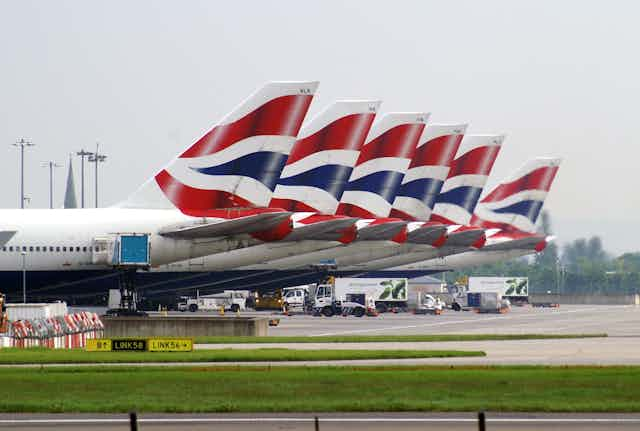British Airways cabin crew are staging a 48-hour strike from January 10, in a dispute over cabin crew pay. The strike has been called by the airline’s “mixed fleet” staff. This is a separate class of crew, which joined after 2010 and comprise 15% of BA’s total cabin crew.
There had originally been plans for a strike on Christmas Day and Boxing Day. These were called off following an improved pay offer from BA, but the crew members have since voted to reject it. Here, we look at the reasons behind the strike and the extent to which it is justified.
Why does BA have ‘mixed fleet’ crew?
Competition from budget airlines has led to cost-cutting across the board for airlines. The market share of low-fare airlines like Ryanair and easyJet within Europe is over 35%.
To compete, BA created the new mixed fleet category of cabin crew hired on inferior terms and conditions to their colleagues within BA’s other two crews, Eurofleet (who service short-haul flights within Europe) and Worldwide (who service everywhere else).
The irony is that BA played an important role in the legitimising of budget airlines and the highly-competitive air travel market that exists today. In response to the competitive challenge posed by the early low fares’ airlines, many European legacy airlines (those operating prior to the liberalisation of the industry that began in the late 1980s) created their own low-cost subsidiaries. These include the short-lived Buzz by KLM and the more durable Germanwings (Lufthansa).

British Airways also adopted this approach and set up its highly successful subsidiary, Go. As well as legitimising low cost travel, it took many passengers away from BA’s main services. Go was subsequently sold to its management, backed by the investment group 3i, for £111m in 2001, who then sold it to the budget airline easyJet the following year for more than £350m.
What are the problems?
Despite performing the same job, BA’s mixed fleet earn far less than their colleagues on legacy crews. For example, in 2015 their basic starting salary was £12,000 (with an additional £3 an hour when flying). This is compared to an average expenditure per head of all cabin crew of £37,200. Indeed, when industrial action was last threatened by BA cabin crew in 2014, unions at the time claimed that mixed fleet staff were reliant on working tax credits (state benefits) to supplement their income. So, in effect, the government was subsidising BA’s operations.
The survey of European cabin crew we carried out on behalf of the European Transport Workers’ Federation in 2014 revealed the extent of disaffection among BA’s mixed fleet crew at the time. Fewer than 10% of respondents reported that their pay and benefits were adequate to support their current lifestyle and none felt their remuneration was adequate to support future life plans. One study participant commented:
We are commonly known as ‘cheap fleet’ throughout the company for our low costs and how much profit we make for the company. Another recent motto was ‘mixed fleet – to fly, to starve’ (a pun on the BA motto ‘To Fly to Serve’). How they treat us is appalling and it should change.
Flexible working compounds the issue. Rosters are subject to frequent changes at short notice and staff are advised to check their roster on days off and holidays. Members of mixed fleet told us they looked forward to unpaid leave as it gave them some control over their working time.

It seems that little has changed in the intervening two years. In 2016, British Airways’ parent company, IAG, reported operating profits of £1.4 billion. Meanwhile the mixed fleet cabin crew, who act as the face of the company, delivering the customer service quality on which the airline trades, struggle to make ends meet. It is disingenuous, then, that the airline’s response to the threat of industrial action was to call it an “unjustified” attack on customers.
BA has always and continues to trade on customer service. It is doing so very successfully, as its balance sheet of recent years clearly demonstrates. Mixed fleet are an integral part of the cabin crew workforce whose efforts in delivering high levels of customer service in no small way contribute to the airline’s success. This is something critics of their industrial action might think about when assessing whether or not it is justified.
This article was amended on January 10 to reflect that the figure of £37,000 is the average expenditure per head of cabin crew rather than the average salary.

